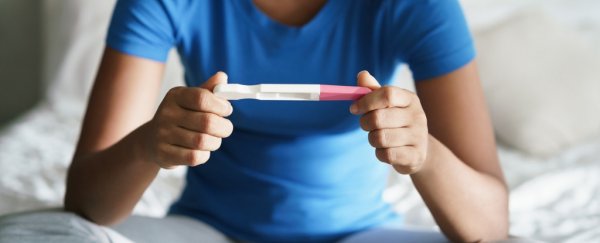The vaccine for human papilloma virus (HPV) is a feat of modern medicine that has proved to be both perfectly safe and highly effective.
After more than a decade of monitoring and research, scientists have found no solid evidence that the vaccine causes fertility problems. And yet, there are still some who refuse to accept this.
Last year, an outspoken anti-vaxxer published some spurious results that suggest America's record-low birth rate is caused, at least in part, by the HPV vaccine. The paper was written by Gayle DeLong, who is not a scientist or medical researcher, and has a history of being involved with anti-vaccination organisations.
"Results suggest that females who received the HPV shot were less likely to have ever been pregnant than women in the same age group who did not receive the shot," she claims in her 2018 paper.
"If 100 [percent] of females in this study had received the HPV vaccine, data suggest the number of women having ever conceived would have fallen by 2 million."
There are several problems with DeLong's conclusions, which have to be viewed in the context of her track record with vaccination science. In 2011, DeLong, who has a PhD in economics and finance, published a paper in the same journal that claimed to find a link between autism and childhood vaccination rates in the US.
This one finding contradicts years of research and was lambasted by scientists and autism experts for its poor methodology and wild conclusions. A few years later, DeLong blamed her breast cancer diagnosis on the stress of raising two autistic children.
Her newest assertions are equally extraordinary and just as flawed. Shortly after her study on HPV was published, at the end of last year, two medical researchers wrote a letter in another journal explaining why the new findings were probably false.
The authors of this letter explain that if the HPV vaccine truly affected fertility, it would take many more years for the national birth rate to slip, since the vaccine is recommended for preteens.
Instead, they argue, this link is probably specious, and the low birth rate we see today is more likely to have arisen from greater access to contraception and the shift toward having children later on in life. Yet because DeLong's research failed to report contraception rates - only birth rates - these factors went completely unnoticed.
The paper's comment section is full of equally skeptical takes. Microbiologist and science communicator Elisabeth Bik recently described the paper as "very flawed and biased" with the potential to be "misinterpreted or misused."
The sample size is a good example of these flaws. While DeLong implies that her study analysed data from the National Health and Nutrition Examination Survey, which represents 8 million women, her actual sample only included 700 females.
What's more, the two groups being sampled - those who received the HPV vaccine and those who did not - were wildly different in size, with over 400 more females in the group not vaccinated against HPV.
Looking at the two groups side by side, there's another confounding factor that sticks out far more than vaccinations. Those women with a college degree, Bik explains, were more likely to be in the vaccinated group and these women also tend to have babies at an older age.
"The author limited here study on women aged 25-29, which is below the average age that women with a college degree have their first baby," Bik states in her critique.
"If you limit the study group to women
If you're wondering how this terrible methodology somehow managed to slip through peer review, there's an answer for that, too. Similar to the author, the journal in which this research was published has a dubious history with vaccination.
In the past, the Journal of Toxicology and Environmental Health has approved a stream of questionable papers from known anti-vaxxers and others with serious conflicts of interest. Among the misleading studies, there are several other papers that feature the long-discredited link between vaccines and autism.
DeLong's recent claims are extraordinarily out of sync with what most other studies have found, and it's unlikely that she would be able to publish them in a reputable outlet.
Recent and more robust research on hundreds of thousands of women has found absolutely no connection between the HPV vaccine and the risk of primary ovarian insufficiency. In fact, experts say the HPV vaccine actually protects females from future fertility issues brought about by cervical cancer.
"Reports of premature menopause after HPV vaccination have received a lot of media attention, including on social media," says Allison Naleway, a senior epidemiologist with the Kaiser Permanente Center for Health Research.
"However, these reports were based on a small number of isolated cases and must be interpreted with caution. To bring clarity to this issue, we conducted a study of nearly 200,000 young women and found no elevated risk of POI after HPV or other recommended vaccinations."
Experts agree that the safety of the HPV vaccine is clear, but it seems as though anti-vaxxers like DeLong are doing anything they can to muddy the waters.
